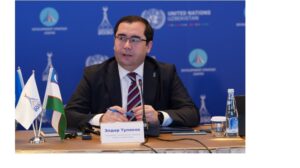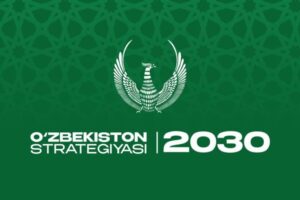-

By Eldor Tulyakov
This year, the draft State Program for 2025 was not merely a government initiative but a collaborative effort, shaped through extensive annual public and expert discussions before its official adoption. These discussions were actively conducted in both chambers of parliament among political party representatives, labour groups, youth, and local communities. The process was made transparent to the public and covered widely by the media, ensuring that everyone had a voice in shaping the future of our nation.
Such open discussions increased public engagement and ensured active participation. Events were organized to raise awareness of the key initiatives outlined in the State Program and to gather valuable feedback from citizens. As a result, around 100 conceptual and over 1,000 editorial proposals from the public and experts were incorporated into the final document.
Notably, these discussions were not limited to domestic participants. The international community and Uzbek citizens living abroad, who are an integral part of our nation, also actively contributed their insights, which were considered in refining the program. Their valuable input has helped us create a more comprehensive and inclusive State Program.
Improving Quality of Life – A Top Priority
One of the primary objectives of the State Program is to enhance the quality of life for the population, ensure environmental sustainability, and broadly implement the principles of a “green economy”. The following key measures will be undertaken:
- Expansion of green spaces: Planting trees along city streets and local neighbourhoods creates green zones.
- Improve transport infrastructure: Developing pedestrian and bicycle lanes, promoting environmentally friendly public transport.
- Water conservation: Implementing innovative water use strategies, including rainwater harvesting and wastewater recycling.
Green Economy and Renewable Energy Sources
As part of the green economy development, 74,172 facilities will be equipped with solar panels, generating an additional 785 MW of power. Moreover, micro-hydropower plants with a total capacity of 225 MW will be constructed. These initiatives aim to increase the share of renewable energy to 40%.
Economy and Investment Climate
To ensure sustainable economic growth, the program prioritizes stimulating the production of export-oriented goods, attracting foreign investment, and integrating local products into international markets.
Economic growth is projected at a minimum of 6% in 2025, with industrial growth at 6.1%, market services at 14.5%, and agriculture at 4.1%.
To enhance export potential, a “firm-by-firm” support system will be introduced for local entrepreneurs, assisting them in accessing global markets.
Reforms in Education and Healthcare
The State Program also includes substantial reforms in education and healthcare:
- Expanding preschool education coverage and establishing mobile education centres in remote areas.
- Developing a “Conducive Learning Environment” program, creating specialized digital and video learning materials for home-schooled children.
- Advancing online education platforms and equipping schools with modern laboratories, sports equipment, and national musical instruments.
- Incentivizing teachers: Uzbek language and literature teachers with certification will receive a 50% salary increase, and 500 foreign specialists will be recruited to schools.
- Inclusive education: Schools catering to inclusive education standards will be established in every district and city.
- Scholarships for low-income families: 3,500 students from underprivileged families will receive grants for higher education.
In the healthcare sector, modernization efforts will include:
- Upgrading medical facilities with modern equipment and establishing centralized laboratories.
- Implementing a digital queue system in hospitals to improve the efficiency and accessibility of medical services.
Reducing Poverty and Increasing Employment
New vocational training centres will be established to reduce poverty and equip youth with skills in high-demand professions. Additionally, investment projects will create new job opportunities, increasing household incomes.
Green Economy and Environmental Initiatives
Special subsidies will be provided to households to install energy-efficient equipment to promote a green economy. Furthermore, 100,000 hectares of green space will be developed in the Aral Sea region, significantly contributing to environmental restoration.
Other environmental initiatives include:
- Planting 32 million fruit and ornamental trees across 9,452 neighbourhoods.
- Cultivating 388 million flowers and shrubs along 8 million homes and 103,778 streets.
Conclusion
The State Program for 2025 serves as a crucial roadmap for Uzbekistan’s sustainable development. It aims to improve public welfare and environmental conditions. These initiatives are designed not only for the present generation but also to lay a strong foundation for future generations.
Therefore, we hope every citizen will support these reforms and actively participate in their implementation. Everybody’s involvement is crucial in ensuring the success of these initiatives and shaping Uzbekistan’s future. ( The author is : Executive Director, Development Strategy Center).

